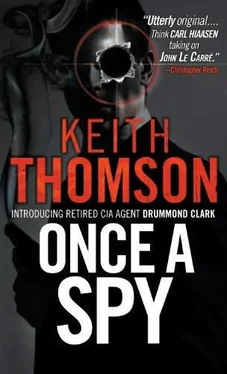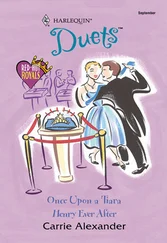Keith Thomson - Once a spy
Здесь есть возможность читать онлайн «Keith Thomson - Once a spy» весь текст электронной книги совершенно бесплатно (целиком полную версию без сокращений). В некоторых случаях можно слушать аудио, скачать через торрент в формате fb2 и присутствует краткое содержание. Жанр: Шпионский детектив, на английском языке. Описание произведения, (предисловие) а так же отзывы посетителей доступны на портале библиотеки ЛибКат.
- Название:Once a spy
- Автор:
- Жанр:
- Год:неизвестен
- ISBN:нет данных
- Рейтинг книги:5 / 5. Голосов: 1
-
Избранное:Добавить в избранное
- Отзывы:
-
Ваша оценка:
- 100
- 1
- 2
- 3
- 4
- 5
Once a spy: краткое содержание, описание и аннотация
Предлагаем к чтению аннотацию, описание, краткое содержание или предисловие (зависит от того, что написал сам автор книги «Once a spy»). Если вы не нашли необходимую информацию о книге — напишите в комментариях, мы постараемся отыскать её.
Once a spy — читать онлайн бесплатно полную книгу (весь текст) целиком
Ниже представлен текст книги, разбитый по страницам. Система сохранения места последней прочитанной страницы, позволяет с удобством читать онлайн бесплатно книгу «Once a spy», без необходимости каждый раз заново искать на чём Вы остановились. Поставьте закладку, и сможете в любой момент перейти на страницу, на которой закончили чтение.
Интервал:
Закладка:
When four men parked a van, studied Perriman as if casing the place, then broke into the neighboring apartment building carrying a fifth man who appeared to be unconscious, she still lacked sufficient cause to order in her team. Upon hearing faint but unmistakable bursts of AK fire, however, a vegetable would have known it was time.
“It’s Desdemona with a green light,” she said into her cell.
“Desdemona, we’ve just been ordered to go home,” came the voice of her backup unit’s chief.
“You’re kidding? By who? Nick Fielding?”
“Yes, as a matter of fact, on conference with the interim national security advisor.”
“What about our cable to HQ?”
“Pending investigation by the inspector general. Meanwhile, our top brass were briefed by the director of the CIA and now they’re basically telling us, ‘Yeah, Nick Fielding’s supposed to be a bad guy-it’s his cover.’”
Alice was incredulous. “Great, he’ll probably win an award,” she said.
Before she could begin to ask any of the questions flooding her mind, the bell on the pub’s entry door jingled. Two young men in Columbia sweatshirts strolled in.
“Hang on,” she whispered into the phone. “Looks like a couple of boys are about to hit on me.”
Sure enough, the young men wandered toward her booth. They wore no coats though the night was arctic. In all probability, she thought, she’d been hit-listed at Echelon or the like. They’d rushed from wherever they’d been lurking when she made her cell phone call.
“We need to talk, Ms. Rutherford,” said the stouter of the two.
“Sorry, angel, you got the wrong girl.”
“It’s okay, Alice, we work for the same uncle you do.”
She believed him. The issue was the thinner man’s hand, inching past his hip and toward the back of his waist.
“I’m not Alice Rutherford, but I’m looking for her,” she said. “I’m Rita Hayworth-Thomas, with National Recon. Here’s my ID.” She flung a cardboard coaster.
Hardly an air-cushioned Bicycle, it wobbled in flight. It slapped the thinner man in the wrist, barely inhibiting him as he drew a silenced SIG Sauer. But it caused a slight delay, allowing her to loose the Beretta from her shoulder bag and fire first. Her bullet hit his knee as he fired. He fell into the next booth, vanishing behind the high seat back. His round bored past her shoulder and into the top of her seat back, creating a cloud of sawdust.
The other man produced a SIG as well. She shot at him while diving for the cover of the bar. When she came down, her head exploded-or felt like it had. The world began to fade. Just before it went black, she glimpsed the barkeep standing over her, gripping a baseball bat.
12
Fielding sat in one of the comfortable Naugahyde recliners in the observation room, puffing a Seora Dominguez cigar. On the other side of the two-way mirror, at the head of the conference room table, Cranch was getting started. His white lab coat, usually crisp and immaculate, was rumpled. He’d traveled for much of the night, first in the vintage motor launch, which made him seasick; then for three turbulent hours in a small jet; and finally in a helicopter buffeted by a snowstorm. Still, he radiated energy and enthusiasm. He would have flown to the moon on his own dime, Fielding supposed, for the opportunity to crack Drummond Clark.
Drummond was still handcuffed to the theoretically uncomfortable chair at the foot of the conference table. A pneumographic tube had been fitted around his chest to measure his respiration rate, a cuff had been inflated around his left bicep to gauge his blood pressure and pulse, and galvanometers had been clamped onto two of his fingers to detect sweat gland activity. The sensors were wired into Cranch’s laptop computer, which was linked to a monitor in the observation room.
“Do you know why you’re here, Mr. Clark?” Cranch asked.
“No, but someone said this is the Manhattan Project complex. I’d very much like to see it.”
“You’ve never seen it?”
“No, will I need a ticket?”
Fielding glanced at his monitor. The polygraph registered no deception.
“Actually, I was hoping to ask you about Placebo,” Cranch said.
“Placebo?”
“The covert operation. Do you know of it?”
“No.”
Again, as far as the polygraph could determine, Drummond’s response was truthful.
“If you don’t mind, Mr. Clark, I need to ask a few meaningless questions, just to make sure this system is properly calibrated. Could you tell me, please, what year it is?”
“1995.”
The yellow, red, and green lines running across Fielding’s monitor were identical to those of the previous responses.
“Actually, Mr. Clark, 1995 was a little while ago,” Cranch said. “Of course everybody forgets the date now and then, right?”
Drummond sighed. “Tell me about it.”
“Actually, it’s 2004.”
“Oh, right, of course.”
“I mean, 2009.”
“Oh, right, right, right.”
“Excuse me for a moment,” Cranch said.
He signaled, and O’Shea opened the door, letting him out. He disappeared into the maze of corridors. A moment later, he trudged into the observation room.
“It’s no act,” he told Fielding.
“I’m not so sure,” Fielding said. “If you hook me up to the poly, I can explain in great detail how purple two-headed men from Pluto and I traveled from another time and shot JFK, and it would read as gospel truth. A number of us can temper our responses that way.” He pointed through the mirror. “He was our teacher.”
“This isn’t an issue of true or false,” Cranch said. “It’s been proven that even subjects with the utmost training and ability respond on some level to meaningful stimuli more vigorously than to nonmeaningful stimuli. If the senility is artifice, and I say something he purports to know nothing about at random, he has no time to ready his defenses. If the information is meaningful to him, like the current year, the polygraph detects it; 2009 read as no more meaningful to him than 1995. If he’d known that it was in fact 2009…” Cranch sank into one of the recliners.
“Okay, so he isn’t lucid-where does that leave us?” Fielding asked, even though Cranch’s deflated look alone probably provided the answer.
“He won’t be able to answer our questions.”
“Well, I certainly wouldn’t mind sitting here in this comfortable chair and enjoying my cigar until he blinks on. The one little hitch is he may have written down details compromising our entire operation — then placed what he wrote in a dead drop somewhere between here and Virginia, to be serviced any minute by God knows who. Isn’t there something you can pump into him so we have a chance of finding out at least that much?”
Cranch shrugged. “Even if we were to penetrate his defenses with an absolutely perfect combination of sodium amytal and thiopental or secobarbital, we’d be asking for information he’s incapable of retrieving, whether he wants to or not. Also, because methedrine-or a comparable stimulant-is a necessary component in a truth cocktail, we’d risk ratcheting him to acutely confusional on a permanent basis.”
Fielding took a long drag of his cigar. He barely tasted it. “I don’t suppose there’s anything on earth-no contraption, no holistic remedy, no prehistoric fish extract-that can spark lucidity?”
“Not really,” Cranch said.
Fielding saw a glimmer of hope. “‘Not really’ is different from ‘no,’ isn’t it?”
Cranch’s lips tightened. “It was done. Once. In 1916.”
“1916? By who, Dr. Frankenstein?”
“A Dr. Lovenhart at the University of Wisconsin. He was experimenting with respiratory stimulants, and to his amazement, a catatonic patient, after being injected with sodium cyanide, opened his eyes and answered a few basic questions. It was the first time he’d said a word in months. But immediately thereafter, due to complications inherent with sodium cyanide, he dropped dead.”
Читать дальшеИнтервал:
Закладка:
Похожие книги на «Once a spy»
Представляем Вашему вниманию похожие книги на «Once a spy» списком для выбора. Мы отобрали схожую по названию и смыслу литературу в надежде предоставить читателям больше вариантов отыскать новые, интересные, ещё непрочитанные произведения.
Обсуждение, отзывы о книге «Once a spy» и просто собственные мнения читателей. Оставьте ваши комментарии, напишите, что Вы думаете о произведении, его смысле или главных героях. Укажите что конкретно понравилось, а что нет, и почему Вы так считаете.












